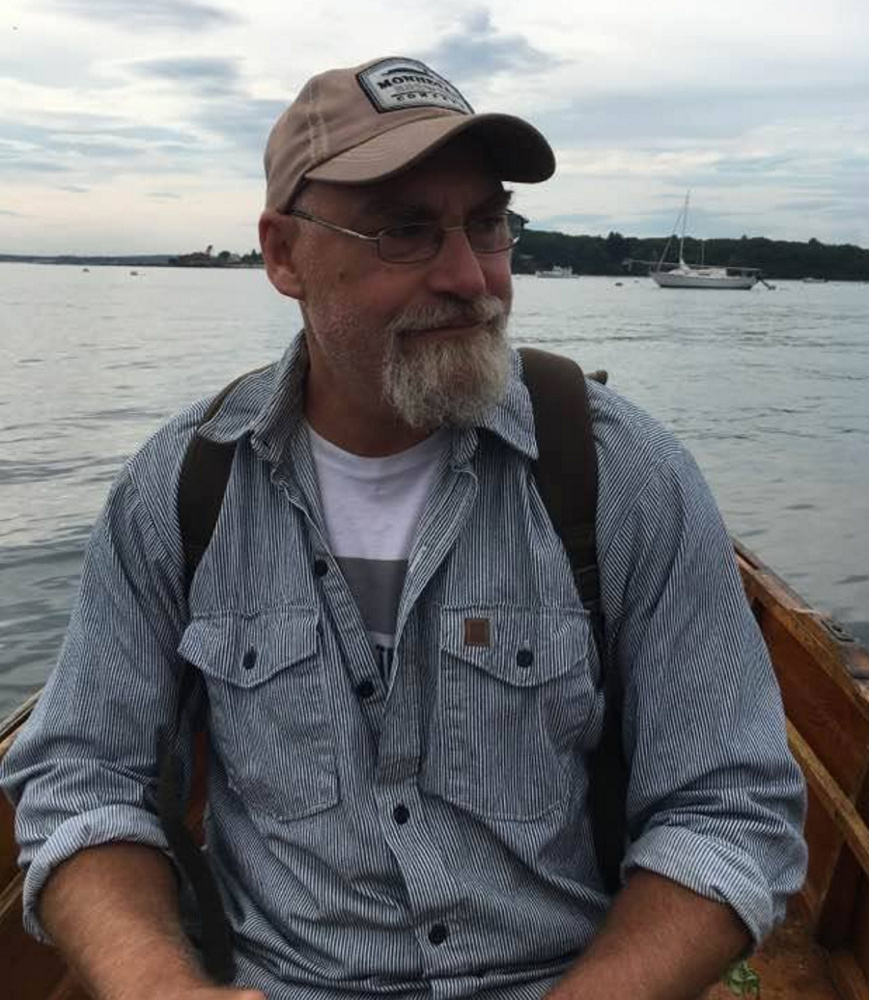In the novel “Hauling Through,” Jamie Kurz is a confused graduate of Bridgewater College located in Brementon in Maine’s midcoast. Think Dustin Hoffman as Benjamin Braddock in “The Graduate.” But instead of finding himself unleashed on suburbia like Ben, Jamie flounders about in a very close and very salty fishing village at the edge of Casco Bay. Kestrel Cove, where he has taken a job as the third man on a lobster boat, is unlike anything Jamie has ever encountered.
If Bridgewater and Brementon sound familiar, it is because Peter Bridgford, the author, is a Bowdoin graduate. And if Kestrel Cove feels very realistic, it is because Bridgford has worked on a lobster boat (and other commercial fishing boats on both coasts). He has also thru-hiked the Appalachian Trail in winter and been a teacher (at Portland’s Breakwater School, among others).
Since 2014, Bridgford, who lives on Peaks Island, has turned his energies to writing. Based on his first novel, I would say he made an excellent choice. Its quirky cast of characters, not to mention situations, makes “Hauling Through” an engrossing and entertaining read.
Take the village of Kestrel Cove, for instance. Its residents are convinced that they are being watched by a Soviet satellite that flies over every day at 8 p.m. For most, this means heading for cover at that time, although at least one resident enjoys the opportunity for extreme sub-orbital exhibitionism.
Bridgford delights the reader with colorful individuals whose behavior and personalities only occasionally bump against credulity, and always with refreshing gusto.
There’s Jamie’s boss, the hardest-driving captain in the whole lobster fleet; his sternman, whose compulsive TV-watching has made him an improbable fount of esoteric trivia; a mystery man “with more money than God.” These, plus many more, make Kestrel Cove vibrate in the reader’s imagination. In fact, there are so many of them, in and beyond the village, that at times “Hauling Through” takes on the energy and bawdy charm of an 18th-century picaresque novel.
Throughout it all, we experience the pain as the “college boy” – initially a derisive moniker that gradually gains an affectionate overtone – makes a corresponding shift from terror to the need to fit in. Needless to say, love has a lot, but not everything, to do with gormless Jamie’s evolution.
Bridgford’s ear for dialogue is pitch-perfect, which among the lobstermen, especially when they are razzing the “college boy,” precludes quotation in a family newspaper. He also has an eye for the little detail that makes a scene come alive. When the sternman pauses mid-sentence, “taking a deep drag on this cigarette and holding the smoke for a moment before releasing it forcefully at the ceiling of the cab,” his frustration is palpable.
The author has an equally distinctive knack for description. Under stress, Jamie finds the lobster boat’s close-quarters “like a big Bavarian clock with pop-out figures that twirl and spin in their own little circles, as if dancing with their own personal demons.” And as the fall comes on: “Morning frosts were now common, and the woods were now fully committed to their transformation into a patchwork of oranges, browns and reds.”
Not the least of the book’s interest is in the seasonal progression and how it affects the lives of the lobstermen and their families.
“Hauling Through” is a wonderful first novel, but it has flaws. At 475 pages, it is too long. And when the reader gets there, the end is contrived and disappointing. There’s a sub-plot that has more liabilities to it than assets: Jamie is a scholar of the Civil War, which gives him the annoying habit of seeing any given situation in his personal life in terms of that conflict. “Instead of slinking away with his tail between his legs, he knew that he had to counterattack like Lee against McClellan at Second Bull Run.” Fortunately this tick subsides as the novel unfolds.
I wish Bridgford had developed the Soviet rocket theme further. As it is, the sputnik acts as bookends to the story, with the mysterious multi-billionaire serving as a deus ex machina in a comic-book shootout. But it does produce a memorable car chase, with a very funny running dialogue between the governor of Maine and the driver who has kidnapped him.
For all these criticisms, there is much more to enjoy and admire in “Hauling Through.” Bridgford is a superb storyteller. I hope we will hear more news from Kestrel Cove and its denizens in the future.
Thomas Urquhart is a former executive director of Maine Audubon and the author of “For the Beauty of the Earth.”
Copy the Story LinkSend questions/comments to the editors.




Success. Please wait for the page to reload. If the page does not reload within 5 seconds, please refresh the page.
Enter your email and password to access comments.
Hi, to comment on stories you must . This profile is in addition to your subscription and website login.
Already have a commenting profile? .
Invalid username/password.
Please check your email to confirm and complete your registration.
Only subscribers are eligible to post comments. Please subscribe or login first for digital access. Here’s why.
Use the form below to reset your password. When you've submitted your account email, we will send an email with a reset code.